Blades, Godinez sisters cruise to Pan-Am golds
Saturday, May 10, 2025 - 07:02 By Vinay Siwach

MONTERREY, Mexico (May 9) -- Olympic silver medalist Kennedy BLADES (USA) made a golden debut at Pan-American Championships, winning gold medal at 68kg in Monterrey, Mexico.
Blades, who won silver medal in Paris at 76kg, led a spirited performance from the United States which claimed three gold medals out of the six Women's Wrestling weight classes in action on Friday.
Apart from Blades, Audrey JIMINEZ (USA) and Tiffani BAUBLITZ (USA) won gold medals at 50kg and 72kg respectively. Canada won two other gold medals through the Godinez sister -- Karla and Ana -- at 55kg and 62kg, respectively. Cuba won the remaining gold at 57kg through Yaynelis SANZ (CUB).
Blades wrestled in a Nelson bracket and after dominating her way to the final, she faced Nathali GRIMAN (VEN) for the gold medal. It was Griman who opened the scoring with a stepout but Blades blasted a double-leg attack for a takedown to take a 2-1 lead. On restart, Griman was on her heels and Blades hit another double-leg, this time for four points.
The big moves continued as Blades used her strength for another double-leg takedown for four points and lead 10-1. Griman countered a Blades move and flung her for four points on the edge to cut the lead to 10-5.
In the second period, Blades got a two-point takedown and moved closer to victory with a 12-5 lead. Griman gave her the perfect opportunity when she missed a deep shot and Blades scored a go-behind for a 14-5 victory.
Jiminez downed Paris Olympic silver medalist Yusneylis GUZMAN (CUB), 18-8, in the 50kg semifinal before pinning Madison PARKS (CAN) in the final.
Parks got a point as Jimiez was put on the 30-second activity clock. But she answered with a two-pointer to lead 2-1 at the break. Parks scored a stepout in the second period before Jiminez launched a cradle and kept Parks' back on the mat to secure the fall with two minutes remaining in the match.
In the semifinal, Guzman led with a takedown before a clumsy ankle-pick and throw made it 6-0. Jiminez got on the board with a takedown but the joy was short-lived as Guzman countered a low attack and scored two more points to lead 8-2 at the break.
The second period was all about Jiminez as she snapped Guzman and scored a go-behind. She transitioned into a leg-lace and turned Guzman four times to pull off an unprecedented, 18-8, win and enter the final.
The third gold medal came through Tiffani BAUBLITZ (USA) who won both her bouts in round-robin system. Baublitz faced off Nyla BURGESS (CAN) in the second round and the winner would win gold.
Baublitz scored takedown in the opening 10 seconds to lead 2-0. Burgess got a stepout to cut the lead to 2-1 but Baubtiz got a stepout to make it 3-1 at the break.
Burgess turned the tide in her favour with two clutch takedowns in the second period to lead 5-3. Baubtiz managed to get a single-leg attack to exposure for two points but a reversal added one point to Burgess' score and she led 6-5.
Baubtiz never gave up to get the lead back. As the two wrestlers engaged, she flung Burgess and got a stepout to take a 6-6 criteria lead with 57 seconds remaining. She defended her lead and clinched the gold at 72kg.
Godinez Sisters Golden
Karla and Ana GODINEZ (CAN) claimed gold medals to give Canada two champions in Women's Wrestling. Karla, wrestling at 55kg, outscored her opponents 31-0 in three bouts. She was in a four-wrestler round-robin bracket and won her matches 10-0, 11-0 and 10-0 for the gold medal.
The elder Godinez, Ana, returning to competition for the first time since finishing a heartbreaking fifth at the Paris Olympics, secured a fall in the 62kg final against Astrid MONTERO (VEN) to win gold medal.
She won her first two bouts via technical superiority and the semifinal via fall before Montero challenged her in the final. Montero built a 3-0 lead at the break and Godinez needed something special in the second period.
After giving up another stepout, Godinez got a takedown and then cradled Montero for the fall with 1:50 remaining on the clock to win the gold medal.
Cuba won the gold medal at 57kg as Yaynelis SANZ (CUB) denied home favorite Bertha ROJAS (MEX), 6-0, in the final.
Sanz was put on the activity clock in the first period but she used a duckunder to get behind Rojas. She elevated Rojas's leg and the Mexican tried to hit a cut-back which Sanz defended and fell forward with Rojas on the mat for two points. It became 4-0 when Sanz scored a takedown before the break.
In the second period, Rojas missed an attack and Sanz was quick to go behind but Rojas defended for a while before the scramble resulted in Sanz getting the takedown and a 6-0 lead. Sanz defended that lead and won gold.
U.S. claims Greco title
The United States claimed the Greco-Roman team title with 209 points. After winning five gold medals on Thursday, it added one more as two Greco weight classes were in action on Friday. Mexico finished second with 143 points and Venezuela was third with 90 points. Cuba, which only had three wrestlers entered, finished fourth with 75 points as all three of them won gold medals.
Alejandro SANCHO (USA), who won the gold at 67kg last year, won the gold medal with ease at 72kg this year after beating Nilton SOTO (PER) 8-0 in the final.
Sancho was clearly the aggressor from the word go and scored a stepout. When he got the par terre advantage, he scored two points from a correct throw to lead 4-0.
He kept the pressure in the second period as well and scored a stepout before adding two more stepout and a point for caution against Soto helped him win 8-0, his fourth technical superiority win of the day.
At 97kg, world champion and Paris Olympics bronze medalist Gabriel ROSILLO (CUB) defeated Paris Olympian Kevin MEJIA (HON), 5-1, in the final.
Mejia got the par terre but as he tried a turn, Rosillo slipped out and tried a reverse lift. He failed to execute it and Mejia landed with no exposure. Mejia quickly scored a go-behind for a 3-0 lead. However, Cuba challenged the decision and won on review, reverting the lead to 1-0.
In the second period, Rosillo got the par terre and after a little battle as Mejia defended the position, Rosillo scored a body slam and got four points to lead 5-1 which he defended till the end.
The gold medal was Rosillo's only second at the Pan-Am Championships, the first coming back in 2019.
RESULTS
Women's Wrestling
50kg
GOLD: Audrey JIMENEZ (USA) df. Madison PARKS (CAN), via fall (4-2)
BRONZE: Nohalis LOYO (VEN) df. Kamila BARBOSA (BRA), 4-1
BRONZE: Yusneylis GUZMAN (CUB) df. Yorlenis MORAN (PAN), 12-2
55kg
GOLD: Karla GODINEZ (CAN)
SILVER: Louisa SCHWAB (USA)
BRONZE: Andrea AVELINO (MEX)
57kg
GOLD: Yaynelis SANZ (CUB) df. Bertha ROJAS (MEX), 6-0
BRONZE: Luisa VALVERDE (ECU) df. Ana PEREIRA (BRA), 10-0
BRONZE: Amanda MARTINEZ (USA) df. Mia FRIESEN (CAN), 12-2
62kg
GOLD: Ana GODINEZ (CAN) df. Astrid MONTERO (VEN), via fall (4-4)
BRONZE: Melanie JIMENEZ (MEX) df. Savannah COSME (USA), 3-0
68kg
GOLD: Kennedy BLADES (USA) df. Nathali GRIMAN (VEN), 14-5
BRONZE: Virginia JIMENEZ (CHI) df. Debanhi TAPIA (MEX), 4-4
72kg
GOLD: Tiffani BAUBLITZ (USA)
SILVER: Nyla BURGESS (CAN)
BRONZE: Michelle OLEA (MEX)
Greco-Roman
72kg
GOLD: Alejandro SANCHO (USA) df. Nilton SOTO (PER), 8-0
SILVER: Irving SALAZAR (MEX) df. Cristian MEJIA (GUA), 9-0
97kg
GOLD: Gabriel ROSILLO (CUB) df. Kevin MEJIA (HON), 5-1
BRONZE: Michial FOY (USA) df. Dorian TREJO (MEX), 9-0

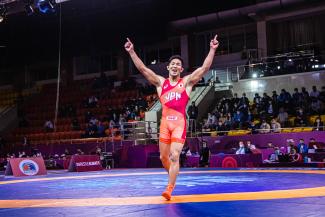
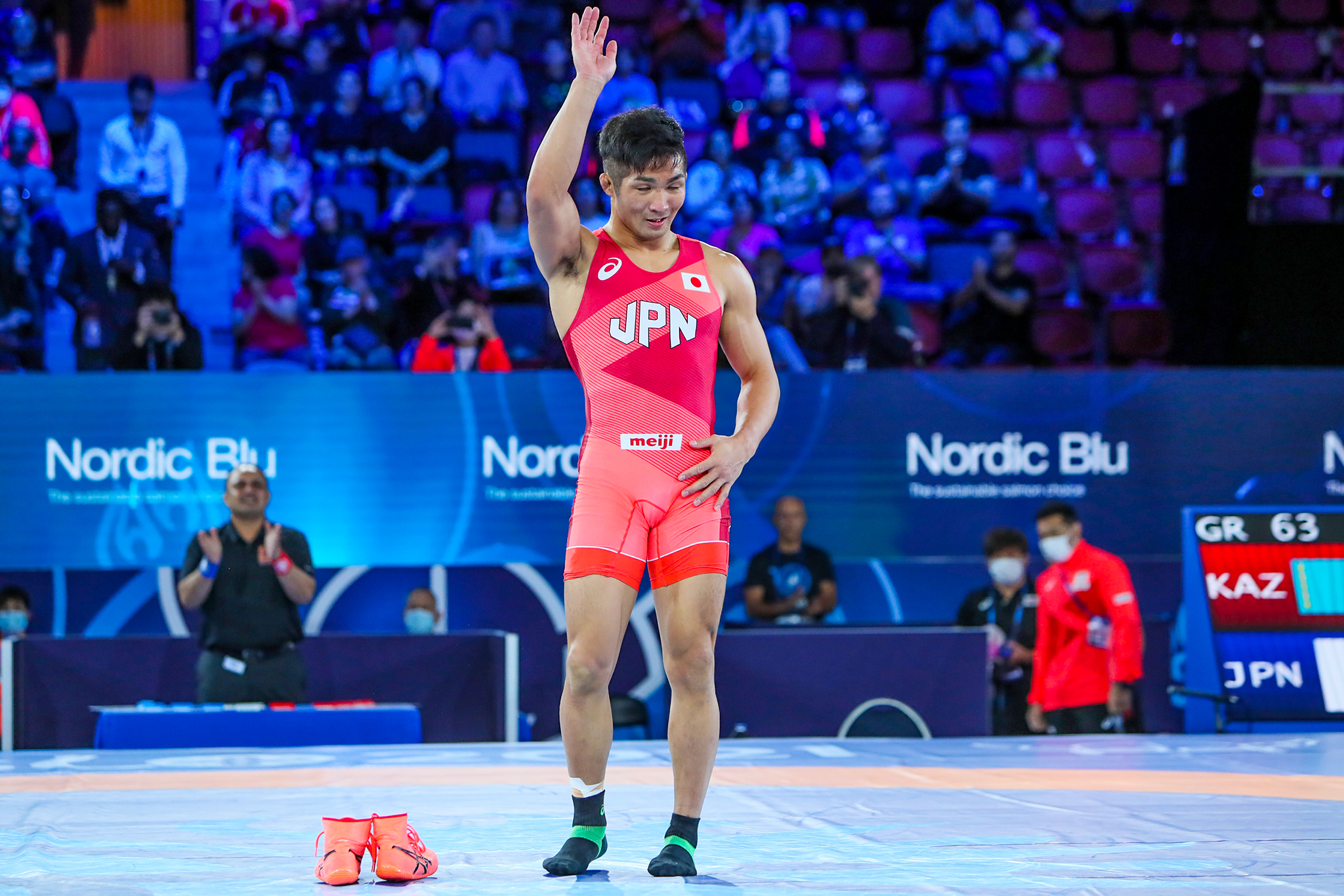 Tsuchika SHIMOYAMADA (AUS) had left his shoes on the mat during the 2021 World Championships to mark his retirement. (Photo: United World Wrestling / Martin Gabor)
Tsuchika SHIMOYAMADA (AUS) had left his shoes on the mat during the 2021 World Championships to mark his retirement. (Photo: United World Wrestling / Martin Gabor)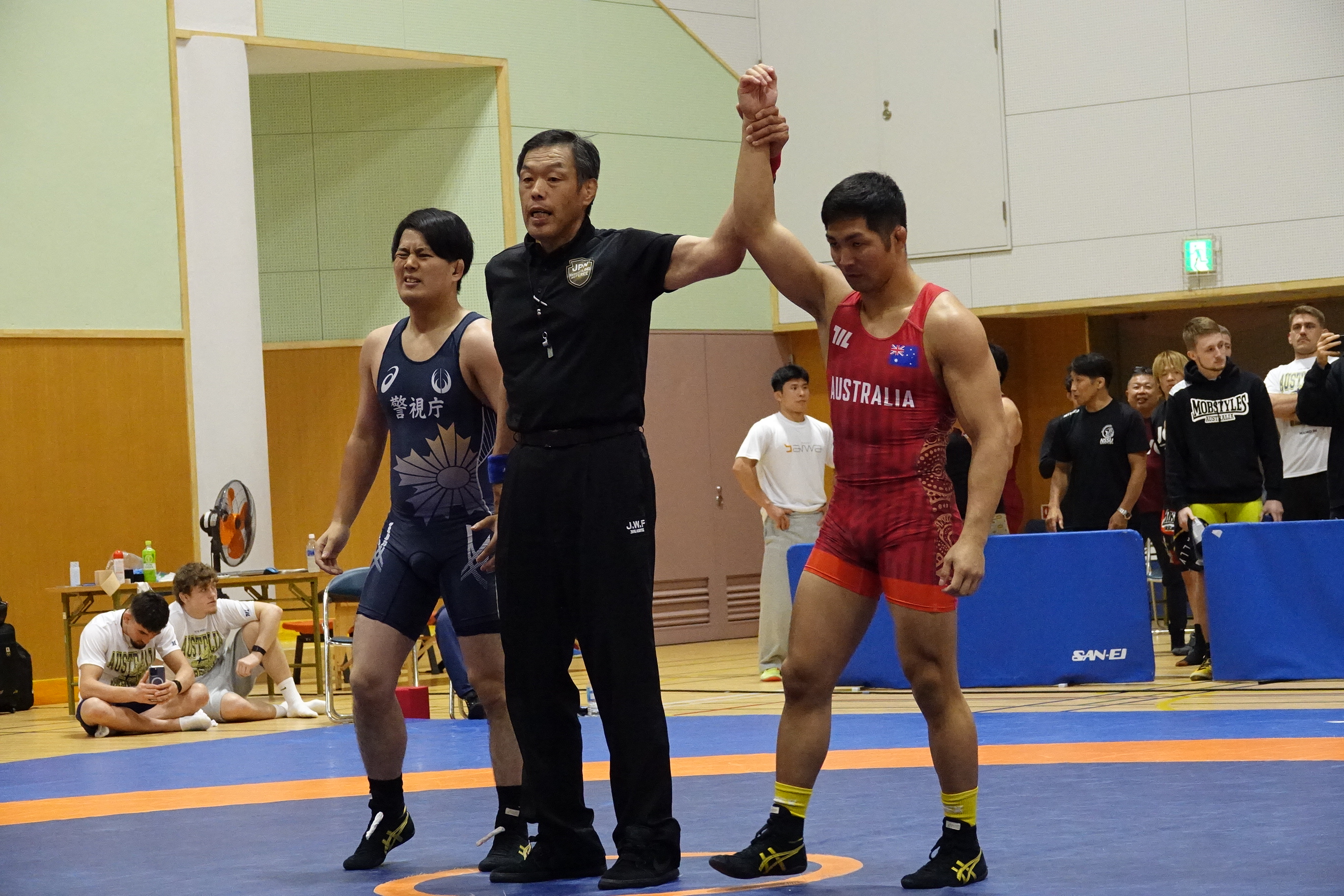 Tsuchika SHIMOYAMADA advances to the semifinals at the All-Japan Non-Student Championships in July with a 52-second win over Kokoro GOTO. (Photo: Koji Fuse / wrestling-spirits.jp)
Tsuchika SHIMOYAMADA advances to the semifinals at the All-Japan Non-Student Championships in July with a 52-second win over Kokoro GOTO. (Photo: Koji Fuse / wrestling-spirits.jp)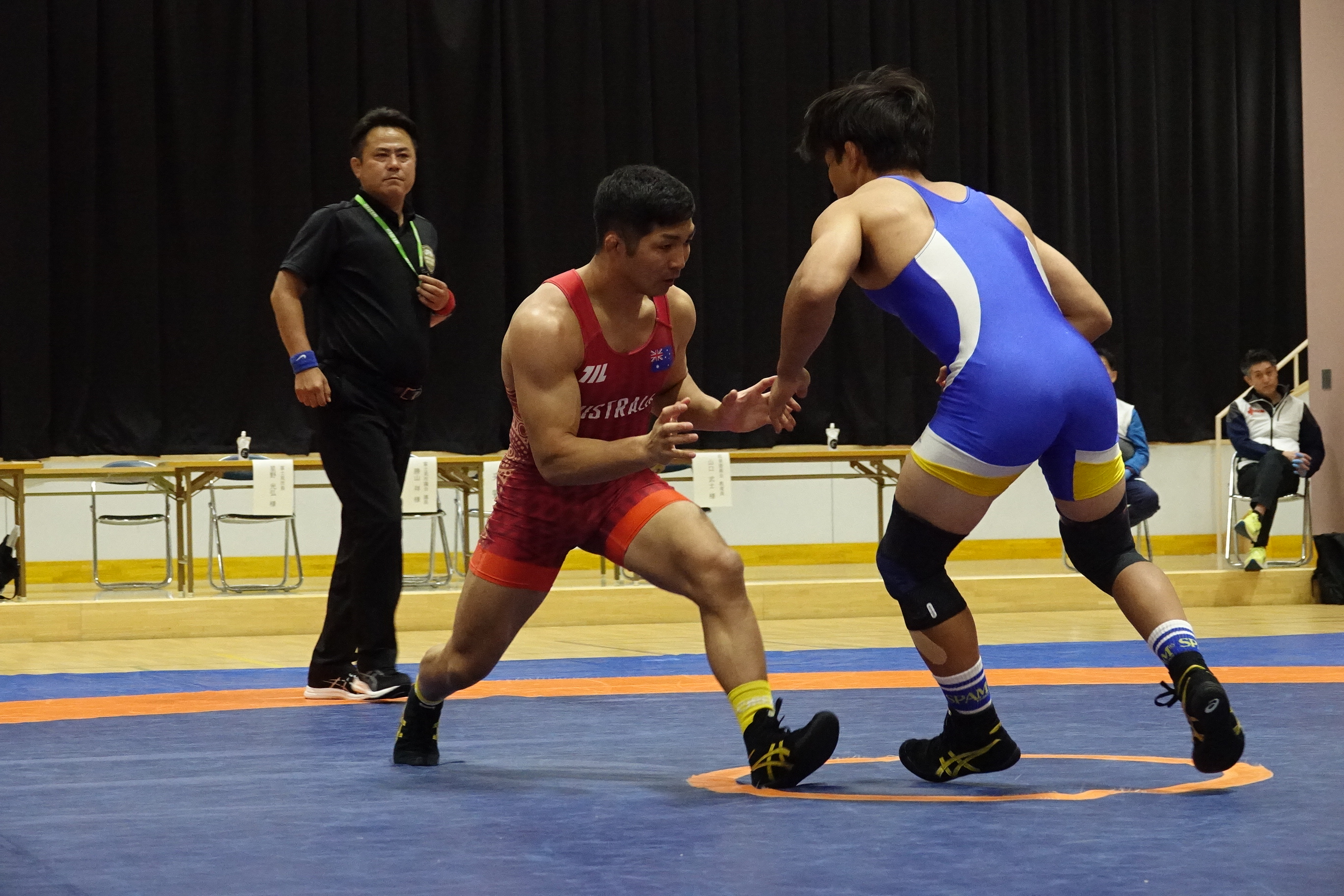 Tsuchika SHIMOYAMA faces Keitaro ONO in his opening match at the All-Japan Non-Student Championships in July. (Photo: Koji Fuse / wrestling-spirits.jp)
Tsuchika SHIMOYAMA faces Keitaro ONO in his opening match at the All-Japan Non-Student Championships in July. (Photo: Koji Fuse / wrestling-spirits.jp)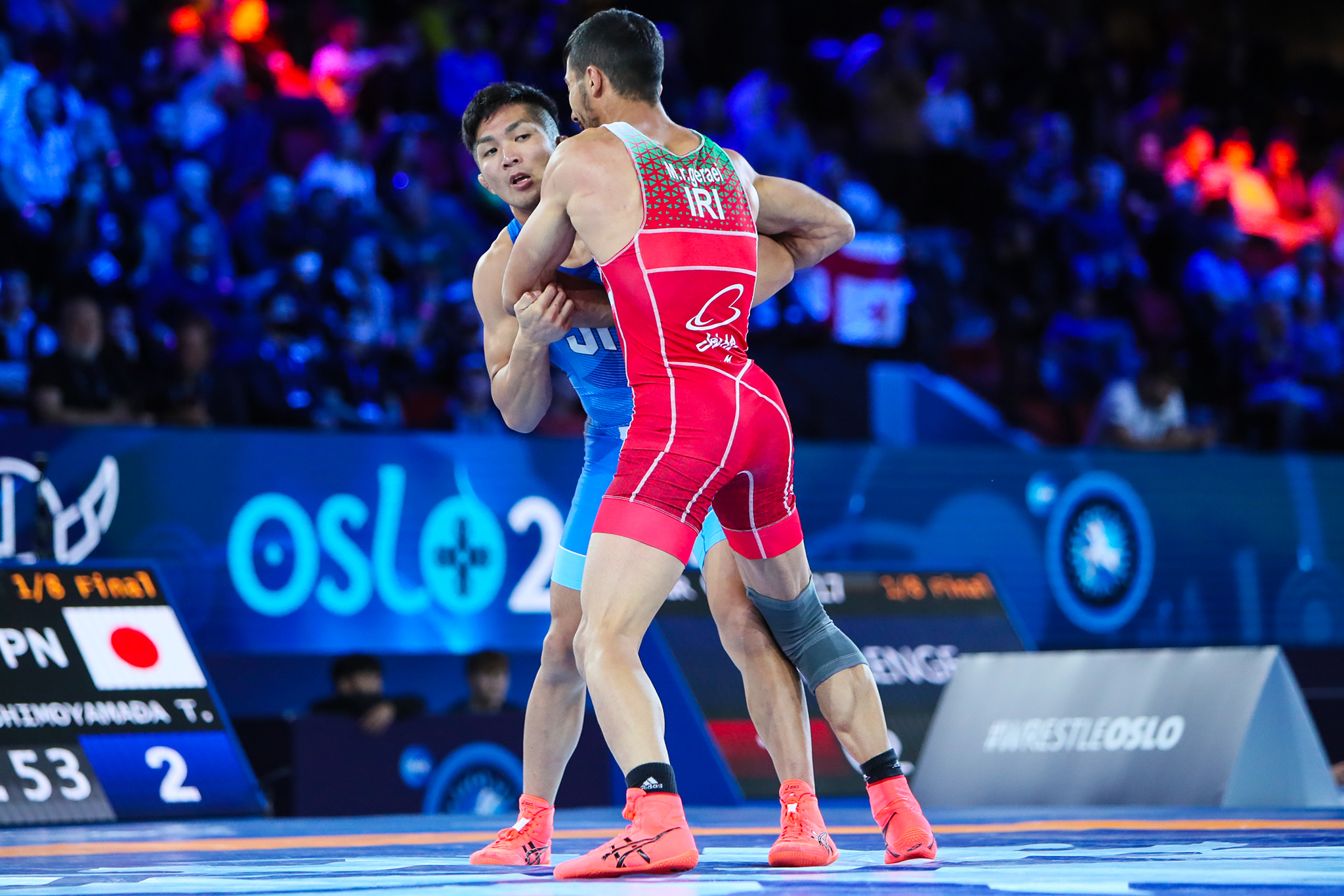 Tsuchika SHIMOYAMADA (AUS) was dominating Mohammadreza GERAEI (IRI) in their match at the 2021 World Championships before being pinned. (Photo: United World Wrestling / Martin Gabor)
Tsuchika SHIMOYAMADA (AUS) was dominating Mohammadreza GERAEI (IRI) in their match at the 2021 World Championships before being pinned. (Photo: United World Wrestling / Martin Gabor)
Share your thoughts.
Comments